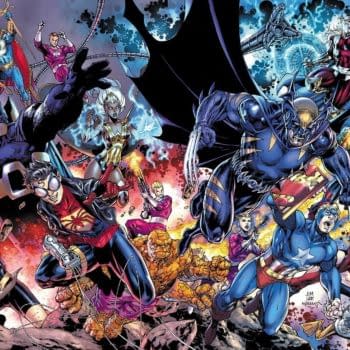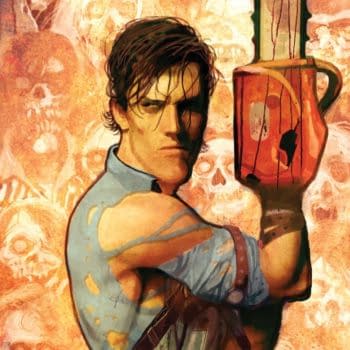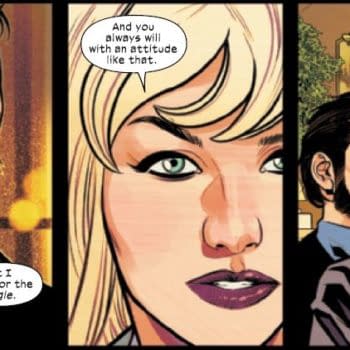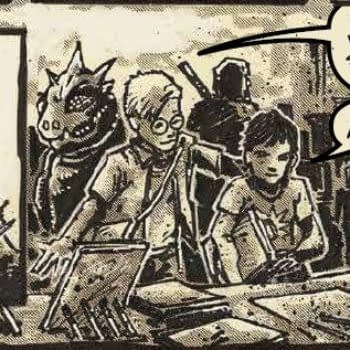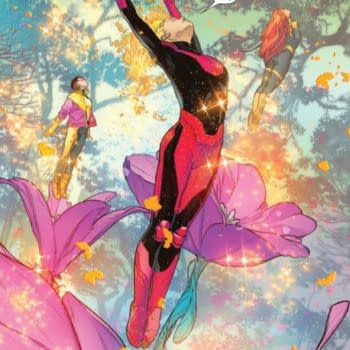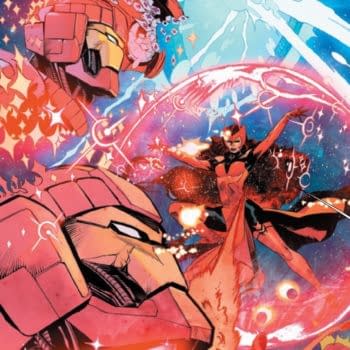Posted in: Comics | Tagged: airbender, avatar, Comics, dark horse
Review: Avatar: The Last Airbender TPB
Skip Harvey writes;
If you are reading this and haven't seen The Nickelodeon series Avatar: The Last Airbender, then do yourself a service and watch it RIGHT NOW. Lock your doors, hunker down and marathon it.
Not only is Avatar the single greatest children's show ever made, but it's in fact, one of the single greatest TV shows I've seen since The Wire. Don't laugh, I'm dead serious. Genuine and heartfelt character development, realistic political intrigue, daring action, and superbly constructed story make it beyond reproach and beyond my reluctance to use hyperbole.
Just as I was wary of the idea of following up Avatar with The Legend of Korra, I was equally skeptical of the comic series that would bridge the two shows. Granted, the fanboy in me would have given my right arm to see more of that world, I was concerned that it would be impossible to live up to the standard the original series had set. Just as with Korra, my fears were quickly laid to rest.
Avatar: The Last Airbender TB "The Promise" is a fantastic glimpse into the post-series universe because it also dares to ask the important questions and never loses touch with its premise.
If you subscribe to the school of thought that the original Avatar series is an allegory for WWII then this comic series will ring all the more true. When Aang defeats Ozai, the story ends with a sense that all will now be right with the world. Nations will come together in peace to rebuild their once proud cultures and usher in a Golden Age. But, just as with the fall of Germany, there is mad race for power, resources and yearning for retribution. Here there isn't as much a solution to the world's ills but a swirling primordial soup amid the chaotic aftermath; a world who no longer has clear ideas of who villains and heroes are.
Both Aang and Zuko find themselves attempting to unify the nations of the world by keeping them isolated from each other, hoping to avoid traditional clashes. Unfortunately politics, bad blood and old wounds make their mission ultimately more challenging. They must move out of the looming shadows of their predecessors and find embrace their places as leaders, making the difficult choices in a world of grey areas.
In this particular arc, the Fire Nation colony of Yu Dao that had once belonged to the Earth Kingdom is being reclaimed by its former inhabitants, feeling that their stake to their former homes is just. Zuko is now Firelord but still struggles with being pulled between his duty to his people and the challenges faced in the absence of his father. The evil Firelord Ozai is gone and the world seems on the path to peace, but in true Avatar fashion nothing is quite so black and white. Zuko must protect his people from an invading Earth Kingdom army, but knows his father's violent ambition was the reason for the colony's conquering in the first place. Under both the guidance of former Avatar Roku and a desperate plea by Zuko, Aang reluctantly promises to use his powers to end the new Firelord if he goes astray from a path of peace.
Today Yu Dao is populated by not only Fire Nation citizens, but a combination of different ethnic backgrounds. New social and personal dynamics have emerged organically, ideas of static identity have begun to blur in a post Ozai world. Fire Nation lives side by side with those other ethnicities who have settled in the colony, many have married, had children and forgotten about old divisions. The people of Yu Dao see themselves as children of a new world and many will fight against any army who wishes to claim them. Aang's separate-but-equal policy with the nations of the world suddenly puts him at odds with his own conscience. Is the Earth Kingdom's claim a liberation or an occupation? Does the Fire Nation have a right to defend itself considering its past? Is peace between the two worth splintering the citizens of Yu Dao?
When conflicted Aang often consults his past incarnations for wisdom and guidance. His direct predecessor Roku has long been a source of mentorship, helping him realize his potential to fulfill his destiny in the defeat of Ozai. In this instance, however, Roku agrees with Zuko's request, maintaining that Aang's purpose is to keep the Firelord's machinations at bay. So serious is Roku's assertion that he reveals to the Avatar that Firelord Zuko is, in fact, Roku's grandson, but still must be defeated to protect the peace. He asks Aang to see the people of the world in a larger context so that he may understand the necessity of Roku's advice. As the Earth Kingdom army- under orders from Earth King Kuei- descend on Yu Dao, Zuko feels his back is against a wall. He truly wants to maintain the peace he and Aang envisioned, but has a duty to protect the people of the Fire Nation against a violent aggressor. Ozai's crimes make the Firelord's crown a far heavier weight to bare.

When the dust is settled Aang must once again turn to Roku to resolve the disconnect between them. He knows that the only way to truly lead the world into the future is to be his own Avatar, so Aang destroys his ethereal link with his past self. He must now find his own path as the Avatar, his decisions are his alone. In the most important moment in Aang's life since the climax of the series, he is now an adult and must forge his own wisdom from here on.
Most of you reading this have probably experienced adaptations like this one and have to come to the same general conclusions I have: they're throwaways. They're grocery store comics. This series, though, has proven me wrong. It's crafted with careful respect to the cartoon and never waters down its content. If you are a fan of Avatar and its complex, human universe, this series will not disappoint.








